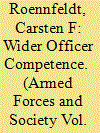| Srl | Item |
| 1 |
ID:
117760


|
|
|
|
|
| Publication |
2012.
|
| Summary/Abstract |
Taking issue with Hobson and Lawson's rejection of the historical turn, this article argues that what is at stake in the turn is the type of knowledge of politics International Relations scholars should produce, and the relationship between theory and practice. The relevant issues are not, then, exhausted by answering the question 'What is history in International Relations?'; instead, the turn forms part of a wider movement in the social sciences away from neo-positivism and its deficient vision of history. The article follows one line of thought on non-neo-positivist International Relations and its relationship to history that seeks to emphasise the centrality of historical knowledge to political praxis understood as practical wisdom or phronesis. However, while a turn is thus to be welcomed, because the impact of International Relations knowledge lies ultimately in the relationship between the academy and politics, the stakes of the historical turn lie beyond International Relations, adequately historical or not.
|
|
|
|
|
|
|
|
|
|
|
|
|
|
|
|
| 2 |
ID:
163576


|
|
|
|
|
| Summary/Abstract |
Identifying and developing officer competence is important to a nation’s security and a crucial attribute of a legitimate military establishment. Critics have claimed that the U.S. officer corps favors a narrow conception of expertise that limits the armed forces’ utility as an instrument of policy. Drawing from the dialogue between Huntington and Janowitz, as well as Aristotle’s notion of practical wisdom, this article proposes a wider understanding of officer competence consisting of four distinct conceptual categories. The U.S. defense establishment favors “military skill” over other categories of competence. As a result, the officer corps is poorly prepared for 21st-century warfare. To remedy this situation, professional military education should cultivate military leaders that, in addition to military skill, have sociopolitical competence and practical wisdom. In this context, this article suggests strategies to develop such competencies that officers need to be able to achieve a diversity of national political goals.
|
|
|
|
|
|
|
|
|
|
|
|
|
|
|
|